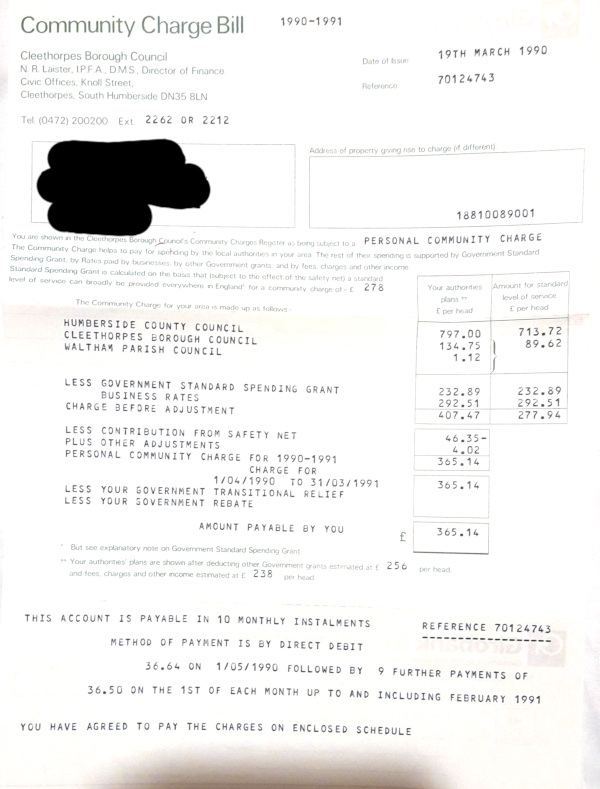The paper archives (part one)
Or, evidence worth keeping
Back before Christmas I mentioned that I had finally persuaded The Mother to let me start clearing out some of her accumulated junk. Well, there’s a long way to go yet on that of course, but I’m slowly making progress. Slowly working through piles of things that really should never have been kept, sifting through them just in case there is anything important in there, like family photos in the middle of a stack of 40-year-old bank statements to give one real example. And then, there was one thing I came across, that potentially does have genuine historical interest. Well, there were two (one for each of my parents), but this is one.

It’s a poll tax bill! Even though I was only small, I remember these arriving in the post and being a little excited that something controversial and newsworthy was now in our house.
A historical note for anyone reading: the poll tax was a controversial flat tax pushed by the right wing of the Tory Party as a way to fund local government. It replaced “the rates”, a system whose origins dated back to the final years of the Tudor period* based on nominal property values, with an almost-flat system. One single amount for every adult in the same town, unless you were seeking work, in which case there was a discount. Introduced in 1989 in Scotland, 1990 in England and Wales, it was seen as extremely unfair. In early 1990 poltiical demonstrations against in turned into fierce riots; by mid 1990 it was clear there were massive problems with collection and non-payment, and by the end of the year the Prime Minister had resigned over the issue.
This—as you can see from the date—is from the first year the poll tax was introduced in England. It ran for four years altogether, from 1989 to 1993, whilst the Major government hastily thought up a replacement for it. And I am definitely tempted to keep it, as a historical artefact. I’ve destroyed all the ancient bank statements, thrown away the gas bills, but I might keep this as a tiny little artefact of the history of the 1990s. Of course, the most quaint thing now about that period in history is that we had a Prime Minister resign honourably over a disasterous policy, rather than cling on to office with every muscle of their fingers.
There will be a few more things to come from the archives, in future weeks, once most of it has been consigned to the shredder. I do feel like I’ve turned a point, though, where some of the rooms of junk no longer look quite so overwhelmed with junk as they once were. I’m not entirely sure The Mother will appreciate it, though.
The next post in this series is here
* Specifically, the 1601 Poor Law introduced the Poor Rate to pay for social security at the parish level.

 Home
Home